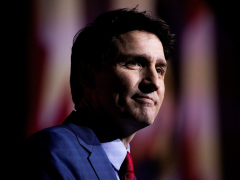Montreal, Canada – “Sunny ways, my friends. Sunny ways.”
That’s how Justin Trudeau, smiling widely and waving to a crowd of supporters, began his 2015 victory speech, just hours after his Liberal Party secured a surprise majority in Canada’s general elections.
“This is what positive politics can do,” Trudeau said, promising to usher in “real change” after nearly 10 years of Conservative leadership under his predecessor, Prime Minister Stephen Harper.
Now, nearly a decade after he swept into power, Trudeau is stepping down as head of the Liberals.
The decision effectively ends his tenure as Canada’s prime minister amid a wave of internal dissent, opposition pressure and weak poll numbers ahead of a looming vote later this year.
“As you all know, I am a fighter, and I am not someone who backs away from a fight, particularly when a fight is as important as this one is,” Trudeau said during a news conference in Ottawa on Monday morning.
“Canadians deserve a real choice in the next election. And it has become obvious to me, with the internal battles, that I cannot be the one to carry the Liberal standard into the next election.”
It is a dramatic fall for Trudeau, who has been at the helm of the Liberal Party since 2013. He took office on a series of lofty promises, from tackling climate change to bolstering social programmes and helping the Canadian middle class.
But Monday’s announcement did not come as a surprise.
Trudeau has faced months of pressure from within his own party, where a growing chorus of Liberal MPs had urged him to step down before the next election. He also had to contend with widespread public anger over his handling of issues ranging from grocery costs to housing.
Most recently, a threat from Canada’s biggest trading partner, the United States, to levy 25-percent import tariffs fuelled a new volley of criticism — and prompted one of Trudeau’s top political allies, Finance Minister Chrystia Freeland, to resign.
“I think, over time, he will be remembered a little more fondly than he is now,” said Stewart Prest, a political science professor at the University of British Columbia.
“But there is a strange tendency for Mr Trudeau to, over time, undermine the things that he would have been best remembered for, in his desire to hang onto power.”

Rebuilding the Liberal Party
The Trudeau-led Liberals secured a majority in the 2015 Canadian elections on the campaign slogan “Real Change Now”.
A former teacher and the son of former Prime Minister Pierre Elliott Trudeau, the younger Trudeau, then 43, promised to unify the country and end years of divisive politics under Harper, who had been in power since 2006.
“We beat fear with hope. We beat cynicism with hard work. We beat negative, divisive politics with a positive vision that brings Canadians together,” Trudeau said in his victory speech.
The centrist Liberals had been trailing the Conservatives and the left-leaning New Democratic Party (NDP) in the lead-up to the 2015 vote. The party had finished third in the previous election four years earlier.
“It seemed like the party’s future was in doubt, and [Trudeau] brought it back to life, so that’s a monumental accomplishment all on its own,” Prest said.
Yet, amid the recent political turmoil and growing public frustrations, the Liberals are once again “in a near-tie with the NDP”, the professor noted.
Recent polls show the two parties hovering around 20 percent support heading into the next election, which must take place before late October. Both are far behind the Conservatives, who clock about 40 percent of public support.
“The Liberals have lost the support of a significant portion of younger Canadians, where they have until now enjoyed a healthy margin of support,” Prest said.
“It seems like increasingly younger voters are feeling alienated by the political system writ large, by the economic system writ large, and are willing to look for more radical options or those who are promising more fundamental change.”
Promises and policies
Yet, when Trudeau first took office, he enjoyed good approval ratings, particularly among younger Canadians, as he began to implement his campaign promises.
In those early days, Trudeau drew widespread praise for ushering in Canada’s first gender-balanced cabinet, evenly split between male and female lawmakers, in one of his first acts as prime minister.
His first budget restored funding to the public broadcaster, CBC/Radio-Canada, and introduced a child tax benefit. Trudeau also pledged to help the Canadian middle class and tackle the climate crisis.
But as his time as prime minister wore on, Trudeau’s popularity slid. His Liberal Party won re-election in 2019 and 2021, but both times as minority governments.
His time in power features a mixed record of successes and failures, said Lisa Young, a political science professor at the University of Calgary. She pointed to the North American Free Trade Agreement (NAFTA) and its successor, the US-Mexico-Canada Agreement (USMCA), as an example.
“In some ways, the finest moment of the Trudeau government was during the first [Donald] Trump administration when they were able to use a pretty sophisticated strategy to be able to save the NAFTA agreement,” she told Al Jazeera.
“They were able to renegotiate, they were able to keep most of Canada’s market access, and they were able to manage through what could have been a very difficult set of economic circumstances for the country.”
More recently, Trudeau’s government also ushered in a series of progressive social policies, including more affordable childcare and a dental care programme. The latter was a key demand of the NDP, which had — until September 2024 — been propping up the Liberal minority government.
“In an era where people had despaired of the possibility of new national social programmes being established, they have been able to find a way forward,” said Young, who added that the measures may be short-lived, however.
“I think that all of those are potentially vulnerable to the change of government. I don’t know that they survive when the Conservatives take office.”

‘Two steps forward, two steps back’
But while he followed through on some of his promises, Trudeau also failed to implement others, including a pledge to do away with Canada’s “first-past-the-post” voting system in favour of proportional representation.
Over the years, rights advocates also have criticised Trudeau’s government for promising one thing but doing another.
For example, amid a US crackdown on migrants in 2017, Trudeau announced on social media that Canada would welcome “thos





